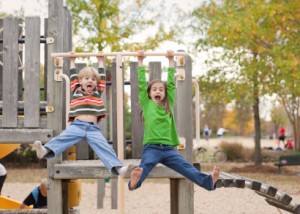Helping Your Kids Develop Healthy Social Skills
 Why Healthy Social Skills Are Important
Why Healthy Social Skills Are Important
For most Carmel Valley San Diego parents, their children developing successful friendships is as important as academic dedication, solid morals, and family values. But as all adults realize, friendships are both complicated and confusing especially for children as most do not understand that friends are anything but perfect and at times can be very supportive, but at other times either overly competitive or envious. By adolescence, most boys and girls take this into stride and manage to accept ups and downs in their friendships as “normal” unless or course there is a break-up with their best friend (BF) or a boyfriend or girlfriend which can feel overwhelming.
Aside from the imperfection of any friendship, is also differences in how the temperament or personality of the child will affect how they interact with others. For example, outgoing children, who do not get easily upset, tend to have an easier time developing friendships then children who are either shy or easily upset by misfortune. Much of this is constitutional, or genetic, but at other times can be based on learning, bad experiences, or modeling how significant people in their lives manage their friendships. Here, children often imitate the type of friendships that the parent of the same sex maintain, whether their mother or father are successful in their interpersonal lives and manage their own conflicts with others.
Another important variable is the type of person a child chooses to befriend and in some cases, the child will seek out a “healthy” friend or group, but in other cases no t make such good choices. This is often due to unconscious motivations based on their relationships with their parents or siblings. As people, we naturally tend to repeat patterns in hopes of undoing or changing previous experiences in hopes of making them better or because they are familiar. As a example, many negative friendships that brew in childhood and adolescence are based on trying to “change” a person who reminds them or someone significant in their life, such as a competitive brother or sister. Here, we see children befriending someone who may not be very nice to them and the child who is trying to heal a previously negative tries each and every avenue to try to get that person to “like and accept them” to no avail and becomes saddened and hurt when their best efforts fail. The motivation here is to be liked by someone who may have too much animosity towards them and it becomes an impossible task. On the other hand, many children naturally pick healthy and positive friends and escape social problems.
Parents though can help this process by teaching their children appropriate social ski lls as soon as their child has attained enough maturity to play with others, something that we call “cooperative play” which is usually possible by the 2nd year of pre-school. Before this, children naturally play aside from other children until they develop enough understanding of another person’s feelings to play together. It is at th e cooperative play period where parents can really help. Most parents allow their children to naturally play with others which is optimal provided their are few conflicts evident based again on both their child’s natural temperament and also positive experiences with their relationships with their parents and watching how their parents interact with each other and other adults. On the other hand, if a parent notices struggles with their child interacting with others, this is where the parent needs to step in and help them navigate conflict and resolution.
As a general rule, I always suggest that between the ages of 3 and 6, when a parent arranges a play date, he or she sits down with the two children and set some basic standards about how their should play together and also have some limits about both the types of games 2 0they may play and also specify what location they should play within – this “structure” then helps set the stage for a successful play time which then becomes learned and hopefully repeated. Some of these basic “rules” should include: sharing; taking turns choosing activitie s; being kind; expressing in words when they are feeling upset; and the parent being available if the conflict becomes too intense for the children to manage. When this occurs, the parent then validates that both children are upset and frustrated, normalize that this is normal in friendships, and then try to get the children to appropriately talk to one another about their feelings, and come up with a resolution. These skills are not innate, but learned from parents and teachers, both the point is that children need social skill training as much as learning how to master academic material.
As mentioned earlier, the choice of friendships come from two areas: previous experiences, good or negative; and the observation of how their parents get along with each other and their adult friends. Remember, children identify with their parents and idealize them and their actions, we as adults are often guided to befriend certain individuals who may not be very nice for wishes to “change them or make them like us”. Children do the same thing. Making clear to children what is important in a healthy friendship is also very important and should be discussed early. Such characteristics should be:
- someone who really likes them for who they are
- has good morals and family values
- manages conflict in a reasonable fashion
- has the tendency to give and receive
- can tolerate ups and downs in a friendship
- has many commonalities, rather than differences with your child
When children, and adults, choose friends who are either too dissimilar of too competitive and envious, the friendship will be continually troublesome and may interfere with both your and your child’s self-esteem and academic or occupational performance.
Despite the best efforts of parents to help foster healthy social skills, some children may need an extra boost from an outside source. Many schools have social skill groups conducted by school counselors and many professionals have groups designed for such efforts.
Key Points:
- parents need to set the stage early for social skill interaction
- help your child and their play date learn how to play together
- help your child learn how to manage conflict resolution early in their development
- get your child to express their feelings in words with both you and their friends
- encourage friends who are more alike than different than your child to decrease competition
- model good reciprocal friendships in your lives for your child to observe
- get some outside help early if necessary
Dr. Keith Kanner is a Licensed and Board Certified Clinical Child, Adolescent, and Adult Psychologist and Psychoanalyst. In addition to running a full-time private practice, he is an Assistant Clinical Professor of Psychiatry in the School of Medicine at the University of California San Diego where he teaches both human development and also trains medical students how to better understand and relate to their patients. He also serves as the Director of Clinical Counseling for La Jolla Country Day School in La Jolla, California, and is a Clinical Professor at The San Diego Psychoanalytic Society and Institute. Dr. Kanner also sits on the National Board of Directors for Kids Korps USA, which is the largest organization in the country that teaches children and adolescents the importance of volunteering to help the community at large. As a father of three children, he is also a dedicated baseball, football, and soccer coach.











You must be logged in to post a comment Login